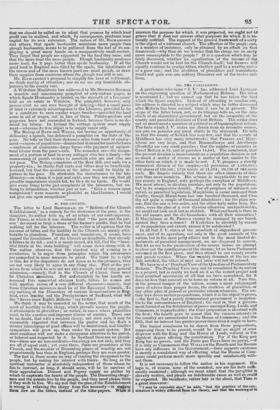II. THE CHURCH.
The letter to Lord BROUGHAM, on " Reform of the Church Establishment," as a remedy for the distresses of the poor, is the slaughter, its author tells us, of an article of our contemporary, the Times, in which it was declared that "the poor and the par- -son" devoured so large a share of the farmer's profits, that he had nothing left for the labourer. The writer is of opinion that the increase of tithes and the hoStility to the Church are mainly attri- butable to pluralism. Pluralism and translation, it seems, have sapped the foundations of the Church so dreadfully, that already it totters to its fall ; and it is much feared, if it fall, that the " beau- tiful fabric of the state building" will come down along :with it. The author observes, that the shortest way of coming to a conclusion, is to argue from principles which his adversaries arc compelled in some measure to grant. We think he is right in this, for if the disputants do not agree as to the premises, they are not very likely to agree in any thing else. Part of the pre- mises from which he sets out are safe enough, and of very general admission,—namely, that in the Church of Christ, there must he Christian ministers. But unfortunately he has hardly an- nounced this somewhat obvious truth, before he comes out with another axiom of a very different character—namely, that these Christian ministers must be of the Episcopal Ch urch..To ray nothing of the Dissenters of various denominations in Eng- land, even leaving out the Presbyterians of Scotland, what will the "Seven (now Eight) Millions" say to this? We think it may be conceded to the writer, that much of the spirit of hostility to the clergy, which prevails among the people, is attributable to pluralities ; or rather, in cases where pluralities exist, to the careless and improper choice of curates. There can be no doubt, that with a resident clergy, not over rich, it may be reasonably expected that between the pastor and his flock a stricter interchange of good offices will be maintained, and kindlier sympathies will grow up, than under the present system. But mere residence will not make a clergyman attentive to his parish, or beloved and respected by it. In Scotland there are no plurali- ties—there are no non-residents—the clergy are not rich, and they are all of equal rank • yet even there, there are grumblers at the Church, and the number of Dissenting places of worship are not proportionally less than in England, perhaps they are even greater. The fact is, there seems no way of binding the clergyman to the people, but by uniting his interest with theirs. So long as the spiritual instructor is absolutely independent of those whom he has to instruct, so long, it should seem, will he be careless of their approbation. Dissent and Popery supply no philter by which to captivate the hearts of the people. The Dissenting clergy- men and the priests live by the people, and they must please them if they wish to live. We say not that the plansof the Establishinent is wrong in relieving the clergy froth this necessity—in 1/gs
them live on the:tithes, instead of the tithe-payers. W it
answers the purpose for which it was projected, we ought not hi grieve that it does not answer other purposes for which it is na- turally unfitted. The support of the general framework ofsociety is the object of a national church. The affection of the peopla can, in a number of instances, only be obtained by an attack on that framework—why then do .we wonder that the clergy are in many cases unacceptable to the people ? It is a question which may be fairly discussed, whether an equalization of the income of the Church would not be best for the Church itself; but farmers will' equally continue to grudge tithes, whether paid to a wealthy rectcr or a poor one ; and the abolition of pluralities and translations would not gain over one solitary Dissenter out of the twelve mil- lions.


























 Previous page
Previous page